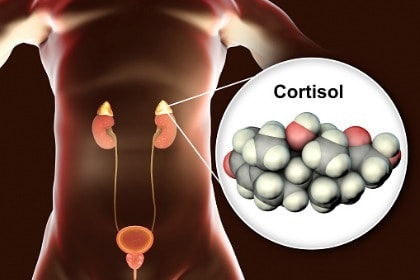Magnesium for Better Sleep: Does it Help & What Type Do You Need?
In a hurry? Click here to read the Article Summary...
If you’re someone who has trouble falling asleep or staying asleep, you likely already know that breaking the cycle of poor sleep can be difficult and frustrating.
There are things you can do, of course, to help improve your sleep quantity and quality. You could try abstaining from caffeine in the afternoon and evening. You could stick to a sleep schedule and stop all screen time an hour or two before bed. But these adjustments don’t help everyone. If you’re among those who have tried countless sleep “remedies” and not felt any benefits… what then?
There are multiple studies showing that the majority of American adults don’t consume enough magnesium [1]. Being magnesium deficient puts you at a higher risk for sleep disorders [2] and many other serious health issues. If your body is deficient in magnesium, you may find that supplementing with magnesium for better sleep is just the answer you’ve been looking for.
Read on to discover 4 important reasons why magnesium is important for helping you get better sleep and tips for finding the best type of magnesium for sleep.
Magnesium for Better Sleep: 4 Ways Magnesium Can Support You
Magnesium is one of the most prevalent minerals in the human body and every single cell and organ in your body requires it for performing hundreds of functions [3]. For example, more than 325 biological enzymes are dependent on magnesium, many of which are located in the nervous system [4].

Sleep promotion is one of the processes with which magnesium is intimately associated. Almost 50% of older adults suffer from insomnia. Not surprisingly, magnesium deficiency is also more prevalent in older adults.
A century ago, the average daily intake of magnesium for an adult was 475-500 mg. These days, typical magnesium intake is closer to 175-225 mg daily, which is nowhere near enough to satisfy your body’s requirements.
Magnesium works in four major ways to improve sleep quality:
#1. Magnesium Promotes Relaxation of the Brain & Nervous System
A brain that’s too busy will certainly not help you get to sleep. We don’t need studies to tell us that if we want to sleep well, we need to be able to relax at bedtime. This is where magnesium can help.
Probably the most important function magnesium has with regard to sleep is its ability to help calm down the central nervous system. This in turn helps the brain to power down for sleep. It also helps to keep the brain functioning at a calmer, more relaxed state throughout the night.
Curious about how that happens? Magnesium is believed to help promote relaxation by these 4 mechanisms:
#1. Magnesium activates the part of the nervous system that is necessary for resting and digesting – the parasympathetic nervous system [5].
#2. Magnesium is required for the regulation of certain neurotransmitters – chemical messengers that send signals throughout the brain and nervous system. In particular, magnesium increases the availability of gamma-amino-butyric-acid (GABA), which is a calming, relaxing neurotransmitter. When GABA levels are low, the brain has a much more difficult time quieting down enough for sleep [6,7]
#3. Magnesium promotes the secretion of the hormone melatonin, which helps regulate circadian rhythm and synchronizes sleep-wake cycles. In so doing, melatonin facilitates the transition to sleep and promotes more consistent and better sleep-wake cycles [8].

#4. Emotional and physical stress can deplete the body of magnesium. In fact, studies have shown that the higher our magnesium levels, the lower our cortisol levels. Cortisol is a hormone released in response to stressful situations and stressed thinking, and too much of it can keep you from sleeping well… or at all [9]. Magnesium has been shown to reduce cortisol levels [10].
#2. Magnesium Helps Improve Sleep Quality
There are two studies, in particular, that have shown that magnesium can be beneficial for helping to achieve a deeper and more relaxing state of sleep.
In a small 2012 double-blind placebo-controlled clinical trial (considered the gold standard of trials), 46 elderly adults were given either 500 milligrams (mg) of magnesium or a placebo, for eight weeks [11]. At the conclusion of the study, the group receiving the magnesium reported having a better quality of sleep. Researchers found they also had higher levels of melatonin and renin (another hormone that helps regulate sleep).
A 2011 study by Italian researchers [12] investigated elderly people with insomnia. The study participants received a supplement containing a combination of magnesium, melatonin, and zinc. The study participants reported:
- having an easier time getting to sleep
- better quality of sleep
- less of a problem awakening from sleep
- improved alertness the following morning
#3. Magnesium May Help Improve Mental Health
Anyone who has suffered from depression or anxiety will tell you that it absolutely can and does have a negative impact on sleep. Fortunately, recent research on magnesium shows it can benefit mental health.

Researchers have found that people with magnesium deficiencies often suffer from depression, anxiety, and a lack of ability to concentrate [13].
A 2015 American study [14] found that having low magnesium levels was significantly associated with depression – especially in younger adults.
Can magnesium supplementation help people who have depression and anxiety? A 2016 review of research [15] investigating magnesium and depression concluded:
“The mood-improving potential of magnesium compounds have been confirmed by the results of numerous pre-clinical and clinical studies. It seems that magnesium supplementation is well-tolerated and enhances the efficacy of conventional antidepressant treatments, and as such could be a valuable addition to the standard treatments for depression…”
A 2017 review of research [16] on magnesium and its effects on subjective anxiety in humans had mixed findings. Researchers stated that although the studies were fairly poor in design and more well-designed randomized controlled trials were required, the evidence thus far suggested a beneficial effect from magnesium for those suffering with anxiety.
#4. Magnesium May Support Pain Relief
Pain is another reason why many people sleep poorly, and magnesium may have a role to play here as well.
Magnesium May Help Ease Post-Op Pain
For instance, a 2013 meta-analysis of randomized controlled trials [17] investigating postoperative pain in surgical patients suggested that administration of magnesium to patients prior to surgery eased postoperative pain.
Magnesium for Migraines & Fibromyalgia

Migraine sufferers were found to benefit from magnesium [18], and those with fibromyalgia may also benefit from supplementing with magnesium [19]. While only preliminary studies have investigated the use of magnesium for fibromyalgia sufferers, this group has also been found to have magnesium deficiencies.
While it may be too soon to conclude whether magnesium is a viable support for chronic pain, the preliminary studies using magnesium supplementation either orally, transdermally (through the skin), or intravenously for fibromyalgia and other forms of chronic pain certainly suggest its potential.
8 Conditions That Can Create Magnesium Insufficiency
As you can see, having low levels of magnesium can either contribute to or cause sleep disorders and a number of other problems that can interfere with a good night’s sleep.
So, what are some of the causes of low magnesium levels? Here are 8 of the most common:
- Digestive diseases like Crohn’s disease, inflammatory bowel syndrome, leaky gut syndrome. These can impair your body’s ability to absorb magnesium properly.
- High carbohydrate diets can increase the elimination of magnesium.
- Certain medications including (but not limited to) laxatives, diuretics, and acid reducers whisk magnesium out of the body.
- Diabetes and insulin resistance. A magnesium deficiency has been observed with both conditions.
- Heavy use of alcohol. A magnesium deficiency is common among those who drink heavily.
- Poor diet devoid of green leafy vegetables and other magnesium-containing foods can cause magnesium deficiencies.
- Stress. Whether it be mental or physical stress, prolonged periods of stress really chew through the magnesium. Chronic stress is well known for depleting the body of magnesium, leading to a magnesium deficiency.
- Age. Many older adults have insufficient magnesium in their diets which is compounded by less efficient absorption of magnesium.
With over half the population being magnesium insufficient and not sleeping as well as they could be, it’s not hard to see why magnesium for better sleep is becoming a go-to for many people.
Which Form of Magnesium Is Best for Sleep?

If you’ve determined that magnesium supplementation is something you want to try to see if it improves your sleep quality… how do you then go about choosing the best type of magnesium for sleep?
In case you’re not already aware, there are multiple types of magnesium available on the market. Some types include chelate, glycinate, citrate, malate, taurate, aspartate, orotate, oxide, chloride, carbonate, and sulfate, to name just some.
To make it even more confusing, you can purchase magnesium in many different formats such as capsule, tablet, liquid, cream, etc. With all of these choices… how do you know which kind will work best for you?
First off, we highly recommend consulting with your healthcare provider to determine if magnesium supplementation will be beneficial for you. More doctors than ever are becoming aware of the dangers of magnesium deficiency and the various health conditions that can be supported from sufficient magnesium intake [20].
The Best Magnesium for Sleep
When it comes to the best type of magnesium for sleep, we recommend looking for types of magnesium that are known to be highly bioavailable. This means that your body is actually able to absorb the mineral and send it where it needs to go.
Many types combine essential magnesium with amino acids or other chemical compositions since magnesium works best when it “binds” with other substances. This is what’s referred to as “chelated” magnesium.
Some of the best (most bioavailable) chelated types of magnesium include:
- Magnesium aspartate (magnesium + aspartic acid)
- Magnesium citrate (magnesium + citric acid)
- Magnesium glycinate (magnesium + glycine)
- Magnesium malate (magnesium + malic acid)
- Magnesium orotate (magnesium + orotic acid)
- Magnesium taurate (magnesium + taurine)
- Magnesium amino acid chelate (magnesium + a mixture of amino acids)

Magnesium citrate is often touted as the best type of magnesium for sleep, as is glycinate, malate, and taurate. But really, any type of magnesium that your body is able to easily absorb to help counter a magnesium deficiency is likely to do the job.
When to Take Magnesium for Sleep?
Another question people usually have when it comes to magnesium for sleep, is what time of day to take it? Magnesium isn’t like taking a sleep aid such as melatonin or a sleeping pill. In other words, you don’t need to take it a certain time before going to sleep in order to gain value from it (although if you find that helps you, then carry on).
The primary benefit of magnesium supplementation is reversing a magnesium insufficiency or deficiency. Therefore, even taking it in the morning can still benefit your sleep at night. Many people like to split their dose of magnesium and take half in the morning and half before bed. As with all new supplementation, consult with your healthcare provider and listen to your body to determine what schedule works best for you and your body.
New Organixx Magnesium 7 Contains Seven of the Best Types of Magnesium
Most magnesium supplements only contain a single type of magnesium. A few brands include two or more types, but very few contain multiple forms. Many of these multi-forms of magnesium also rely on one or more of the cheap kinds of magnesium or undesirable filler ingredients such as magnesium stearate.
Organixx Magnesium 7 contains equal amounts of seven of the very best types of magnesium for sleep (and other health issues), along with two co-factors for better absorption and utilization… all with no stearates, fillers, or other junk ingredients. Magnesium 7 is a premium, broad-spectrum magnesium supplement that supplies 120% of the RDA of magnesium in each 2-capsule serving.
Magnesium deficiency is linked to stress, diabetes, heart disease, osteoporosis, chronic fatigue syndrome, depression, anxiety, trouble sleeping, sore muscles, migraines, and many more debilitating health conditions.
If your body needs magnesium, you want the most beneficial kind your body can actually absorb. Organixx Magnesium 7 gives you seven (7) of the very best, most bioavailable types of elemental magnesium available.

 Sources:
Sources:
Article Summary
Being magnesium deficient puts you at a higher risk for sleep disorders and many other serious health issues.
If your body is deficient in magnesium, you may find that supplementing with magnesium will help you get better sleep.
Almost 50% of older adults suffer from insomnia. Not surprisingly, magnesium deficiency is also more prevalent in older adults.
The average daily intake of magnesium for an adult was 475-500 mg a century ago. Typical magnesium intake today is closer to 175-225 mg daily, which is nowhere near enough to satisfy your body’s requirements.
Magnesium works in four major ways to improve sleep quality:
- Promotes Relaxation of the Brain & Nervous System
- Helps Improve Sleep Quality
- May Help Improve Mental Health
- May Provide Pain Relief
When it comes to the best type of magnesium for sleep, look for types of magnesium that are known to be highly bioavailable such as magnesium citrate, glycinate, malate, and taurate.
New Organixx Magnesium 7 contains equal amounts of seven of the very best types of magnesium for sleep and other health issues.





Do you have a magnesium product that is JUST Magnesium L-Threonate ?
It's the only type of magnesium I can take that doesn't create GI upset.
Thank you.
Hi Layra, Thank you for your interest in our magnesium 7. There are assorted types of magnesium that influence assorted body systems and can influence specific symptoms like mood, mental function, muscle pain, heart health, etc. Some forms like Magnesium taurate, malate, and glycerinate can get past the blood/brain barrier. The most optimal way for you to introduce the varying forms is to take a full-spectrum magnesium that has the best bioavailability. We chose this blend because of the high absorption potential and variety to help your body produce cellular energy and intake the max benefits of this crucial elemental. However, we do not offer L-Threonate as a stand alone product. Have an awesome day! ❤
I would like to know if this is such a great product why isn’t it available in health food stores or other online stores ?
It is a bit pricey .
Hi Shar,
Thank you for your interest in our Magnesium 7. We are an online company. Our products are sold directly from our website as well as on Amazon. This way you can ensure you are receiving an authentic product at the best price. You can find full product information including the label and pricing here https://shop.organixx.com/products/magnesium-7 Have a happy and healthy day!
Is this Magnesium organic?
Hi Phyllis, thanks for your question.
At Organixx we strive to source the highest-quality ingredients available, including USDA-certified organic whenever possible. For all of our products, each of the individual ingredients that are certified organic are specified on the label.
Because magnesium is a mined mineral and not an agricultural product, it falls outside the USDA organic certification program and therefore cannot be certified organic.
Even though Magnesium 7 is not USDA-certified organic, you can rest assured that the ingredients in this premium magnesium complex were selected for their efficacy and quality. It contains none of the cheap forms of magnesium used in most magnesium products. It is also non-GMO and contains NO stearates, fillers, additives, artificial flavors, preservatives, colors, yeast, soy, sodium, or starch.
For more details, feel free to check out the following link where you will find product details, ingredient label, customer reviews, and more: https://shop.organixx.com/products/magnesium-7
Wishing you a happy & healthy day!!
Are you able to order this in Canada?
Hi Sharon, thanks for your interest.
You can purchase our Magnesium 7 supplement via our online store https://organixx.com/.
We do ship internationally, including to Canada, and offer free shipping on all Canadian orders of $149.00 and above. Shipping is a flat $9.95 when minimum purchases are made.
This is indicated in the FAQ section of the product page as well as at check out. Feel free to view it here: https://shop.organixx.com/products/magnesium-7
Also, as all prices listed are in USD (US dollars), these prices do not include potential customs fees. Customs information varies per country, city, and other regional boundaries. None of the customs fees come to us here at Organixx. We always recommend contacting your local post office for more information.
We hope this helps and wish you a happy & healthy day!
Just WHY do you avoid any mention of Magnesium Threonate? And WHY do you decline to answer Gil's question regarding this form of Magnesium?
Hi Stephen, thanks for your question and interest.
We're sorry you feel that way. Please know that was not our intent.
With that said, Organixx Magnesium 7 does not contain Magnesium Threonate. It does, however, contain 7 of the best types of magnesium for bioavailability (Absorption).
1. Magnesium Citrate (Bone Strength)- an essential trace mineral involved in dozens of functions and chemical processes in the body including bone formation, healthy blood sugar management, and metabolism. It’s also a major antioxidant. It’s necessary for the proper functioning of the nervous system, the brain, and many key enzymatic reactions in the body. As an antioxidant, it helps to protect cells from the free radical damage that causes aging and diseases such as cancer. It also aids in blood sugar regulation through its role in the synthesis and secretion of insulin. It plays an important role in energy production, metabolism and activates various enzymes for the proper digestion and utilization of food. Can be especially beneficial for strengthening bones.
2. Magnesium Glycinate (Sleep, Anxiety & Brain Health)- it’s best known for benefits relating to sleep and brain health. It has a soothing effect on the brain and may help calm anxiety. It also helps to soothe pain, including migraines and pain related to PMS. It can promote better sleep, and even assist in stabilizing blood sugar in those with diabetes.
3. Magnesium Aspartate (Mood, Anxiety & Depression)- often used by bodybuilders to enhance athletic performance, recovery, and muscle strength. Many users report finding this form one of the best magnesium supplements for leg cramps and other muscle cramping. Can also help ease symptoms of acute asthma such as breathlessness. Beneficial for neurological and psychiatric diseases, including depression and anxiety.
4. Magnesium Malate (Brain & Nervous system)- helps support and improve ATP (adenosine triphosphate) production at a cellular level, which improves energy and helps reduce pain. It’s an excellent form of magnesium support for issues relating to depression, sleep, chronic pain, and fatigue, including fibromyalgia and chronic fatigue system (CFS).
5. Magnesium Orotate (Heart & Exercise Performance)- supports the energy production pathways found in heart and blood vessel tissue, making it popular among competitive athletes and fitness enthusiasts. It may also help people with heart disease.
6. Magnesium Taurate (High Blood Pressure, Relaxation & “Calming the Nerves”)- vital for a healthy heart, muscles, and bones. It’s essential for maintaining healthy nerve impulses, a healthy heart rhythm, and muscle contraction. It also plays an important role in intestinal health and is the best magnesium supplement for constipation. It helps regulate blood sugar, as well as blood pressure, making it a powerful heart health nutrient.
7. Magnesium Amino Acid Chelate (Muscle Recovery)- benefits include increased stability and superior bioavailability. This allows for more of the mineral to be effectively utilized by the body for the wide range of health benefits that magnesium confers.
The seven forms of magnesium in Magnesium 7 represent the very best types of magnesium recommended by leading health experts for addressing a wide range of health concerns.
With so many different kinds of magnesium supplements to choose from, picking the right one can be problematic. That’s why we’re making the solution easy for you. Magnesium 7 is a premium magnesium complex that serves up seven (7) of the best types of magnesium all in one convenient daily formula. In each 2-capsule serving, you get 500 mg of the highest-quality elemental magnesium in “chelated” (bonded) forms for optimal bioavailability.
For more information, we encourage you to check out the following page where you will find product details, ingredient label, FAQs, and more: https://shop.organixx.com/collections/all-products/products/magnesium-7
We hope this helps and wish you a happy & healthy day!
I ordered the magnesium and was prompted with another deal on the turmeric. Well I paid for both and never got the turmeric. Although it's great I will never order from you again. You are dishonest
Hi Khadijah, I am so sorry for this inconvenience. I see this was resolved via our customer service department. Thank you for allowing us to resolve the issue. Have a beautiful day! :)